#littlehappinesses
moments to remember in Europe
moments to remember in Europe
Sitting at SeaTac airport on December 31, waiting for my evening flight that would take me across the world to Rome, Italy, I thought about how I wanted to approach my time studying abroad.
My mental checklist included the obvious: open myself up to new experiences, language and culture; force myself to be in situations that are totally new and potentially terrifying, knowing that they would provide an unique opportunity for me to grow and more deeply engage with life in Rome.
But in the aftermath of the elation from finding out that I had been accepted into the University of Washington's Communication program in Rome, I decided to keep my eyes and heart open for the small, often overlooked bits of magic, wonder and happinesses enrich my life.
My time in Rome, as well as my travels in other parts of Italy and Europe proved to be inundated with these small happinesses, and I started using the hashtag #littlehappinesses when sharing these experiences on my social media accounts.
And each #littlehappiness brought a smile to my face, warmed my heart and made me so much more appreciated of everything that I am blessed to have in my life: sunset runs along the Tiber River, steaming cups of Italian espresso, whimsical, cobblestone streets, vibrant flowers at corner stands and sweet cones of creamy gelato.
The world is not a perfect place, nor is it entirely beautiful. I don't have good days every day, and my positivity does have a rock bottom. But
what I deliberately chose to do with #littlehappinesses is highlight the
beauty that IS present in our everyday world, the good days that I do have and the decision I appreciate what makes me smile, what makes me happy.
Here I am, two months older (and, hopefully, two months wiser haha), and looking back at my time living in Rome, I see that the #littlehappinesses make the big picture more golden. It forced me to see what is right in front of our eyes, the magic that is present if only we wish to see.
I hope that you enjoy the happinesses that I have shared in the following pages, both written and visual. And my biggest wish is that you also choose to find those #littlehappinesses that are scattered through your life.
Live adventurously,
Hannah
And I swallowed it whole. Because this was my last time on earth before Rome, and while I did not chronicle my life in terms of before and after Rome, I somehow knew that this would be a major turning point for me.
Of course I was nervous as hell, mostly that I wouldn't be able to communicate with someone and that I wouldn't be able to find a pharmacy - farmacia - that sold deodorant. I'd left mine at home and had been traveling for 24 hours.
But no adventure would be complete without a tiny bit of fear. Just enough fear to get you off your seat, out of the comfort of your own living room and out into the great, wide, scary world.
Just enough fear to smile broadly at the smallest joys, to thank strangers profusely and count your blessings when you check to see if your passport is safely stowed away in your money bag for the hundredth time that day.
The rising is the fear flying up and out of your mind, swerving in and out of fluffy cumulus clouds and through your ears.
All you can do is jump on for the ride. Taste the unknown -at once unfamiliar and tantalizing. It's the addrenulum of change that keeps us rolling. And now Rome awaits.
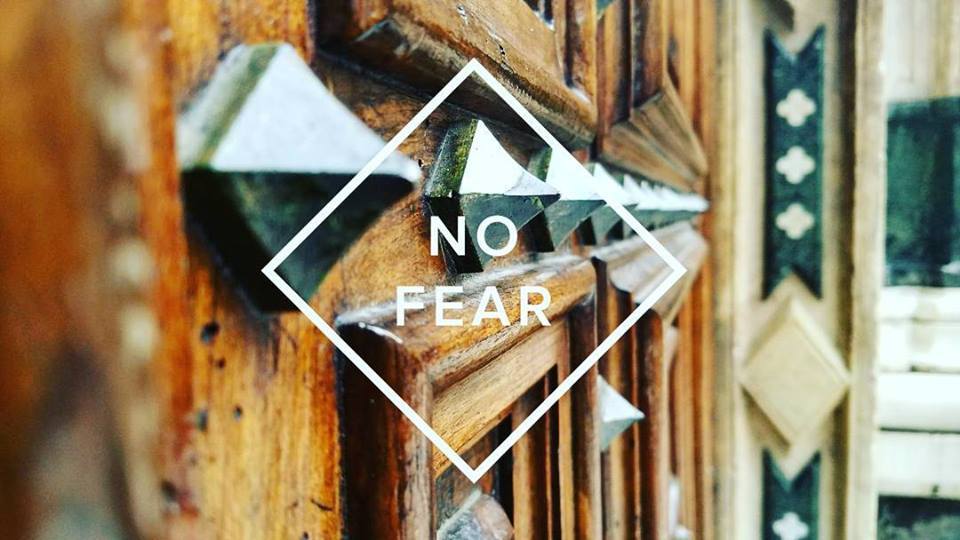
Don't fear the taste of fear; it may be the beginning of #adventure
Merriam-Webster defines the word fear as "a : an unpleasant often strong emotion caused by anticipation or awareness of danger;
b (1) : an instance of this emotion;
(2) : a state marked by this emotion."
I'm not denying that fear can't be unpleasant, that the unknown isn't scary
and that it can be incredibly difficult to take a step out into the universe of the future.
But what lies ahead is often so incredible, so life-changing that it's worth the moment of fear. Listen to that voice deep inside that urges you to step forward and take a chance on your dreams.
In his novel, The Pilgrimage, author Paulo Coelho writes that most people give up their dreams when they "see that they can be realized." The fear of possibility can be more powerful then the fear of the unknown, because it is hard to fear what you have no comprehension of.
Coelho also wrote that people can "refuse to fight the good fight because they do not know what to do with their own happiness; they are imprisoned by the things of the world."
I'm not gonna lie; I struggle with this myself. We're surrounded by a world that feeds off of us caving into our fear and letting it hold us back. But you are worth so much more.
Because adventure awaits.
The unfamiliar isn't scary when you're looking at it straight in the eye from the vantage point of your breakfast table.
The clinking of china resonated throughout the room. It was real china, and even if the coffee came from an instant coffee machine, it tasted delicious. Flavorful. Piping hot; just how I like it.
Maybe the sun will rise today, maybe it won't and it will rain. I half wonder and half don't care at all. The weather and people alike do as they want and we are left to watch them both with amusement and a little bit of fear.
I know so little. about this land, Italy. The internet is a treasure trove of information but sometimes is also a desert devoid of knowledge, like water. Who knows how to find either source (rhetorical question).
I Google search frantically: "Places to visit in Rome", "Areas of interests in Rome", "Best coffee shops in Rome". Valid searches, all of them, but they reveal the limits of their imagination. One has to let go and just roam. Not that you want to get lost, per say (or maybe you do), but to find the tibits of rich knowledge that construct the very fabric of a culture.
I'm rambling, and my cappuccino is almost finished. Foam sticks to the edges of a tiny, glass cup. I always wondered why the cups are white when they get so dirty from the coffee. And white plates, too. All too pretty and dus
ted with the crumbs of past meals and morning conversations.
What day is it anyway? Wednesday? Hours on planes and shifting time zones have warped my comprehension of dates and times, the little details that we cling to and tell ourselves that, with them, we control our world. Maybe it works. Maybe it doesn't.
I'll admit it's kind of nice to not be bound by a calendar. On the other hand, once classes begin, I'll be back to a schedule.
It will perhaps be one where I sleep more than four hours a night on average.
Sounds like a plan. Silly me drinking cappuccinos and worrying about schedules. Reality mustn't be kept waiting.
Heading out into the streets of Rome each morning, I passed dozens of tiny coffee bars that contained clusters of people grouped in semi-circles around the counter, sipping espresso in tiny, white cups, sometimes with a fresh cornetto - croissant - or mini muffin on the side.
I quickly learned that there are no "cafes' in Italy, at least not what I considered a cafe to be. In contrast to the eclectic, edgy cafes that are familiar to any Seattleite, the coffee bars in Italy contained a literal "bar", behind which would be a wall of shelves containing glass bottles of syrups and often alcohol. A couple days in Rome taught me that these coffee bars would often turn into bars after sundown, serving cocktails and alcoholic beverages and staying open until the wee hours of the morning.
In some ways, I'm a stereotypical American; I enjoy my weekend brunches and full breakfast spreads, so I was surprised by the relatively sparse meals that marked the beginning of the day for Italians. But I quickly learned to appreciate the simplicity of a strong espresso or cup of coffee that I brewed in my mini moka pot.
In fact, I had to teach myself a new method to brew coffee when I arrived in Rome right after the new year. I was familiar with the American-style coffee machine, french press and pour-over, but had never used a moka pot before. This small, metal pot can be found all over the city, from homes to restaurants and shops selling home and kitchenware.
At the same time, I was learning how to make coffee with a stronger, more flavorful roast. I often opted for LavAzza or Illy coffee beans, measuring a spoonful into the middle compartment of the moka pot, adding water to the bottom compartment, turning on the heat on the gas range, and waiting for that wonderful, bubbly sound that signaled that my coffee was brewing and filling the upper chamber of the pot.
The ritual of measuring, brewing and sipping my coffee in my miniscule mug became a treasured part of my daily routine in Rome. Since the size of the pot and mug was so small (and my obsession with coffee in large-ish quantities was significant), I often ended up brewing several pots a day.
One adage that people had given to me prior to coming to Italy was that Italians do not drink coffee with milk (like a cappuccino or latte) after the morning was over. This is due to the importance they place on proper digestion, and they believed that having milk later in the day would interfer e with proper digestion after eating.
A part of me rebelled against this custom. I love my cappuccinos; I'll drink one at any time of day, whenever the craving hits. And I had never noticed that it effected my digestion. But - as I soon learned in other cases - what I had been told about Italians wasn't always true. I did see an occasional Italian drinking milk in their espresso after the morning hours, and no barista ever acted surprised when I ordered a cappuccino in the afternoon.
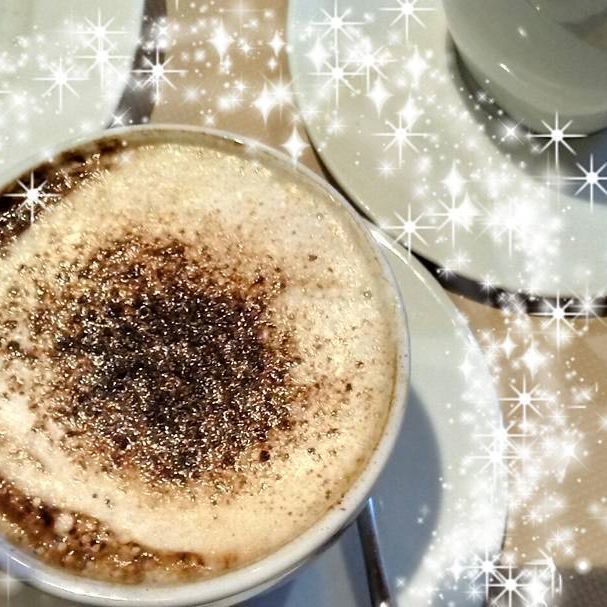 When u go to Barcelona and get your 5 p.m. espresso at an @illy_coffee cafè.
When u go to Barcelona and get your 5 p.m. espresso at an @illy_coffee cafè.
Illycaffe is a major coffee roasting company, based out of Italy. The brand can be found in coffee bars throughout Italy, and their beans can be purchased in supermarkets at a reasonable price -or in the states at a not-so-reasonable price.
As I was packing up to leave Rome and return home, I considered shoving in a bag or two of Illy coffee into my luggage. A part of of me feared that I would return to Seattle - the coffee capital of the U.S. - and find that the
coffee beans there wouldn't compare to those in Italy.
But the more rational side of me dismissed the fear, since there are local coffee roasters whose beans I can buy, that have decent roasts. A couple days later, I busted out my pour over and made a batch of coffee. The first sip confirmed my inner fear that the coffee in the U.S. is too weak!
A desperate trip to Safeway later, and I found that the grocery store chain does sell Illy coffee, but at an exorborant price (probably because it's imported). But they did sell LavAzza, which is another Italian coffee company.
Long story short, listen to your gut because it never fails to lead you to the good coffee.
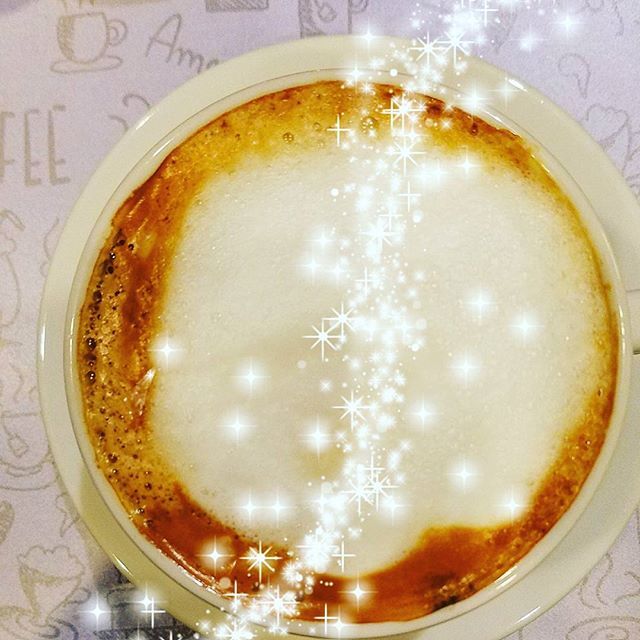 It is better to have drank and lost that drink then never to have drunk at all. #coffeefeels
It is better to have drank and lost that drink then never to have drunk at all. #coffeefeels 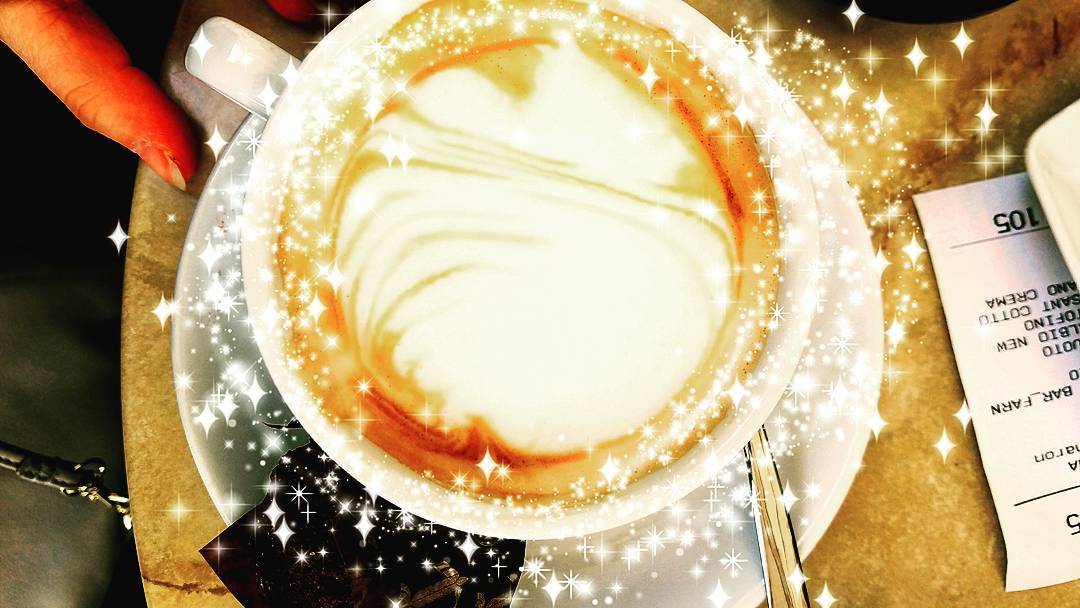 All epic days begin with un cappuccino.
All epic days begin with un cappuccino. 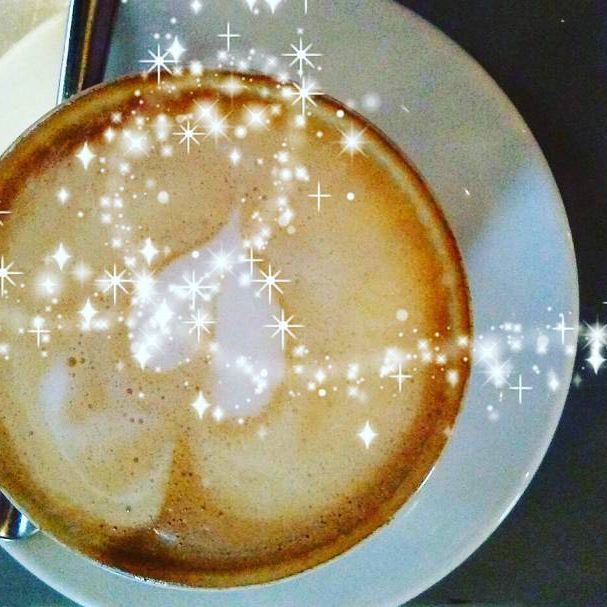 Today's good mood is sponsored by coffee. - Anonymous genius
Today's good mood is sponsored by coffee. - Anonymous genius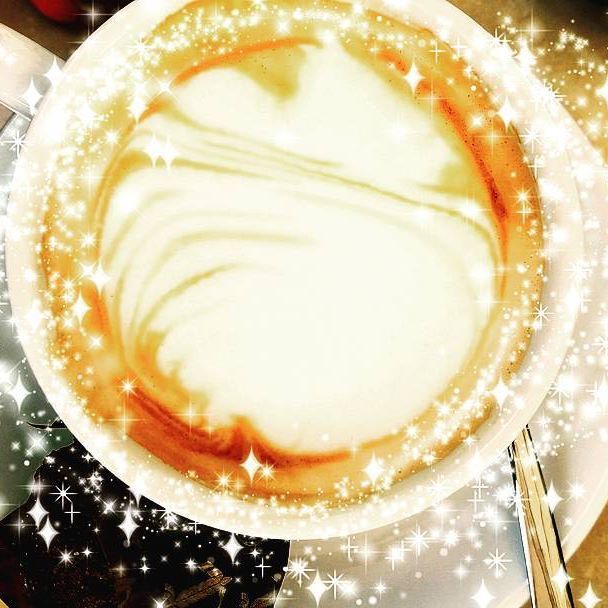 You know the way to my heart #amiright #coffeefeels #thecoffeelife#coffeetime #coffeeshopwisdom#caffephotraphy #caffevibes #sipaway#thebrewedlife #tuesdaymuse #waytomyheart#coffeenclothes
You know the way to my heart #amiright #coffeefeels #thecoffeelife#coffeetime #coffeeshopwisdom#caffephotraphy #caffevibes #sipaway#thebrewedlife #tuesdaymuse #waytomyheart#coffeenclothes
"Prendo in cappuccino, per favore." My first phrase I leaned in Italian.
It's half intentional, half unintentional, my minimal use of my smartphone. I can't talk, text or use the web without connecting to WiFi. So I walk instead. Get lost. Stare at buildings and in windows and people. I unabashedly people watch. How funny, I wasn't like that before.
And the pictures, they are still coming more slowly then anticipated. I don't feel that burning need to capture every nook and cranny of a home or a square. The hunger comes with familiarity with the landscape.
For now, I become acquainted with the woman that is Rome. I get to know her children, her lovers, her casual friends and circle of admirers. Maybe this is a slow beginning of a friendship, but no one is counting the days to the completion of the relationship.
I feel like I'm living suspended between the reality of my home for two months and the reality of the home I left behind. My future is still cloudy: at once unclear and crystallizing.
My confidence grows. I begin to open my tongue and taste the words of everyday Italy: buongiorno, buonasera, buonanotte, si, no, grazie, prego and voglio (I want), Roma...They taste sweet, like a sweet wine that's been warmed under a summer sun. Fresh. Lingering.
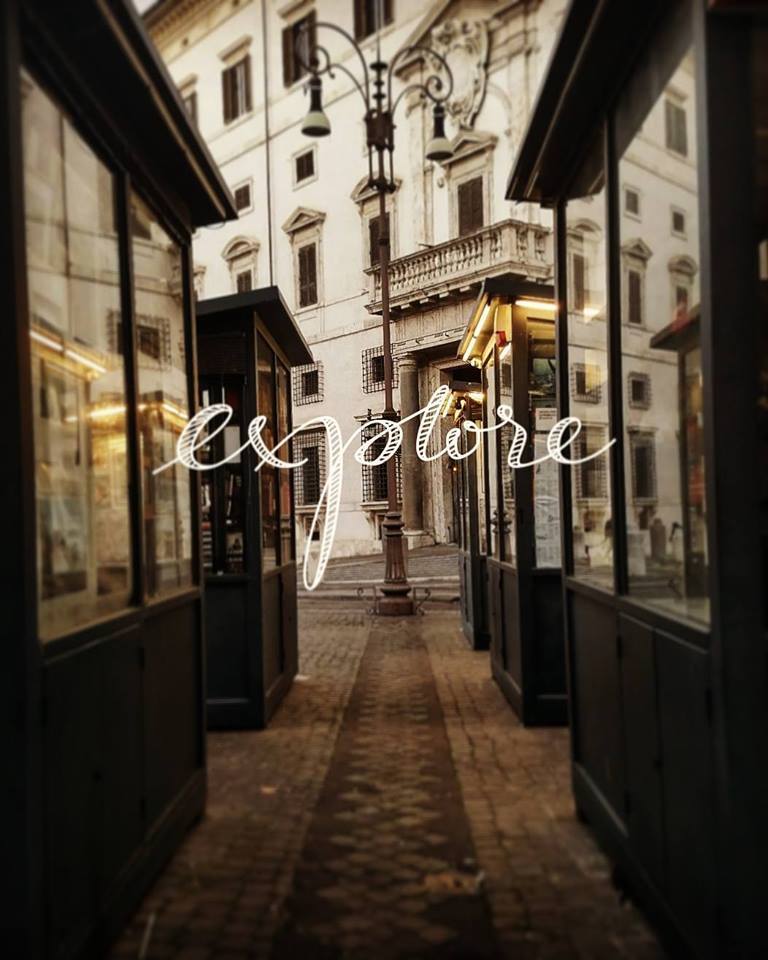 If you ask me to name a prominent characteristic about myself, I would reply that I am adventurous. And, after that reply, you asked me what is one of the values that I possess, I would say it is "to be open to exploration".
If you ask me to name a prominent characteristic about myself, I would reply that I am adventurous. And, after that reply, you asked me what is one of the values that I possess, I would say it is "to be open to exploration".
Let's pause for a minute. By "adventurous" I don't mean that to be
adventurous you have to travel the world, or that exploration means going across the globe and living out of a backpack.
To me, to be adventurous means to be curious. It means asking lots of questions and then going out to find the answers. Taking random drives or walks through your city and exploring unfamiliar neighborhoods or towns. It can happen ten minutes or 10,000 miles from home.
It's a mindset, a way of looking at the world, never being satisfied with only living in your bubble.
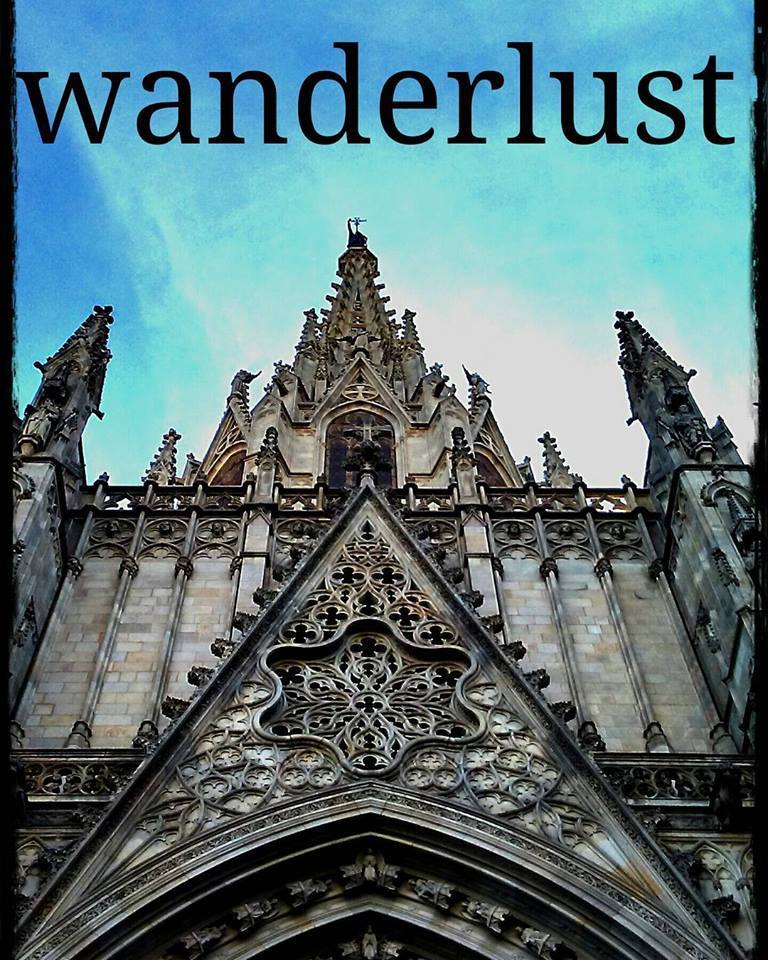
The meaning of the words adventurous and explore took shape for me when I was visiting Barcelona in February 2018. I had never been to Spain
before, but I had heard a lot about the country and the city from my family, many of whom had visited before. Somehow, the fact that my maternal grandparents' families originated in Spain made me feel more connected to a place that I otherwise would have had no connection to.
And it was the total unfamiliarity of the city that really drew me in. Finding out that it was larger then I had imagined, that the cobblestone streets were different then the cobblestones in Rome, eating a paella that was different from the paella that my family cooked and gazing in awe at the intricate splendor of the Sangria di Familia and the Barcelona Cathedral wandering the Gothic quarter, visiting a tiny, stone church to listen to classical guitar artists perform, drinking Sangria at a cozy bar that was built snugly against the side of a small plaza.
Half of my thirst for adventure lies, I believe, in the intrigue of newness, of the totally unfamiliar. But another part of it is an appreciation for how big our world is, how full of stories and architecture and people speaking all different kinds of languages, eating a variety of foods and building communities on the edge of mountains and near the ocean.
When you explore, you never stop learning, and when I'm learning, I'm happy.
And then, after a month in Italy, it struck me that I know so much about Roman history but so little about Italian culture because I do not know its stories.
To know the stories is to know the people. We are all little parts and pieces of the past, making note of what our ancestors have done - both good and bad.
We are living, breathing, moving stories. Always transforming the pages of future generations. Retelling tales. Passing history along like a living form through the stories that one shares and knows so well.
And so I mustn't just walk the streets of Rome to know Rome. I must breath in the stories.
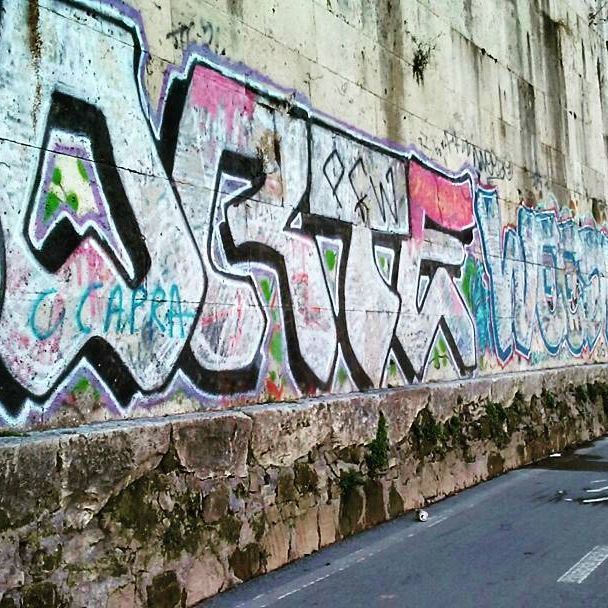
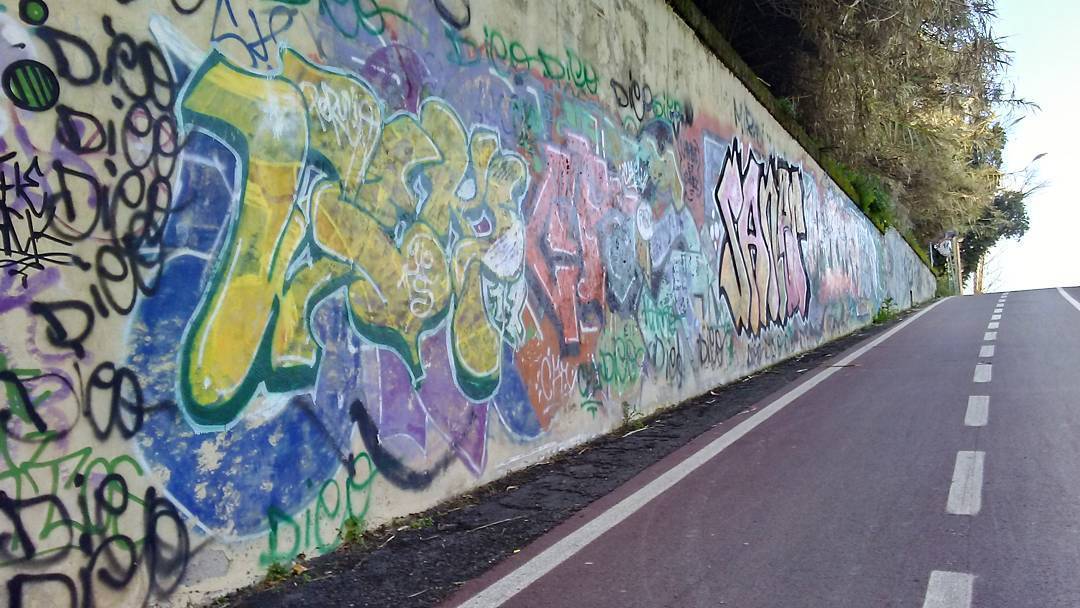 A winter sun at midday hit a vivid surface of yellow, scarlet, purple and green. Facing runners, bikers and strolling couples, a wall borders a trail running parallel to the Tiber River in Rome. Viewing the art, I thought of the phrase "beauty is in the eye of the beholder" and wondered if this graffiti challenged the stereotypical image of what culture and art is. In the shadow of the Vatican and Capitoline Museums, the images suggested a diverse space for communication in a city of art.
A winter sun at midday hit a vivid surface of yellow, scarlet, purple and green. Facing runners, bikers and strolling couples, a wall borders a trail running parallel to the Tiber River in Rome. Viewing the art, I thought of the phrase "beauty is in the eye of the beholder" and wondered if this graffiti challenged the stereotypical image of what culture and art is. In the shadow of the Vatican and Capitoline Museums, the images suggested a diverse space for communication in a city of art. 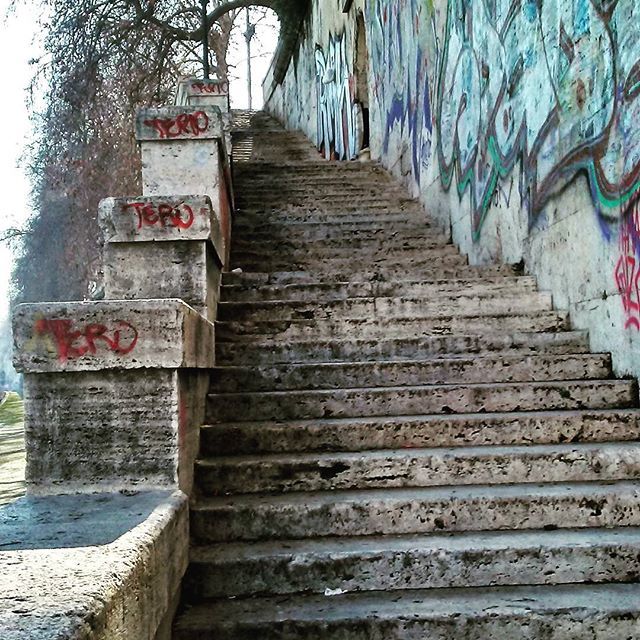 I had climbed up these steps many times, often after a long run along the Tiber River. But preparing to stride up the stone steps one day, I noticed for the first times the various words and images that were painted over the surface of the structure. My Italian lessons had not taught these words, but my eyes were immediately fixed on the words "Tero" which were painted on the outcroppings of stone, three times in a row. I was convinced that they were a message, a code word or had some symbolic meaning attached to them. That evening, I approached my Italian teacher, showed her the photo, and asked her what the word meant. She looked at me blankly, and said, "This is not a word. Maybe it is a nickname." Needless to say, I was a bit disappointed, and had to laugh at myself for assuming that every word has a deeper meaning. I kno
I had climbed up these steps many times, often after a long run along the Tiber River. But preparing to stride up the stone steps one day, I noticed for the first times the various words and images that were painted over the surface of the structure. My Italian lessons had not taught these words, but my eyes were immediately fixed on the words "Tero" which were painted on the outcroppings of stone, three times in a row. I was convinced that they were a message, a code word or had some symbolic meaning attached to them. That evening, I approached my Italian teacher, showed her the photo, and asked her what the word meant. She looked at me blankly, and said, "This is not a word. Maybe it is a nickname." Needless to say, I was a bit disappointed, and had to laugh at myself for assuming that every word has a deeper meaning. I knoStreet art - Trionfale neighborhood, Rome.
Street art - Trionfale neighborhood, Rome
Street art - Trionfale neighborhood, Rome
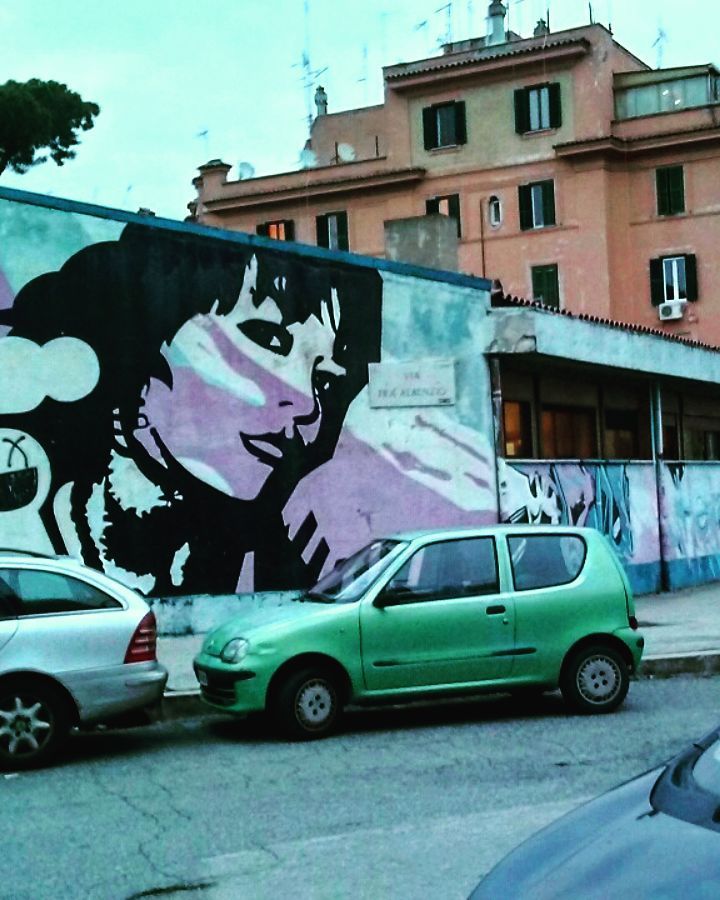 Street art jumps vividly off the exterior of a building in the Trionfale neighborhood of Rome.
Street art jumps vividly off the exterior of a building in the Trionfale neighborhood of Rome.Death. Tombs in walls. Crypts. The connection to the loss I have experienced is ironic, but unintentional.
My heart is drawn in to the music vibrating off of marble and varnished wood and my face, music that rises like the incense's mist that I don't see. Mass is not in session. But still I can smell a tangent hint of it in the air, and it lingers like a memory both sweet and sorrowful.
Because Tata and Papi are smiling at the nativity. I see Tata's lips - carefully covered with a layer of pink lipstick - part, and her eyes beam as only hers could behind gold-framed glasses.
I see Papi take his restless hands out of key-jangling, M&M-filled pockets and cross them in front of his Mariners windbreaker.
Head bowed, hat off, I see him pause before every alter.
The Madonna at each church beckons to me to rest at her feet. Not as a Pilgrim, but as a child. I have found a safe place.
Be at peace.
I can't read the plaques and signs but I can light a tea candle and say a prayer, or place a euro coin in the offering slot, as if to do so will bring me closer to God.
I didn't come here for God. He doesn't live in the church. The people do.
And the people are the church. My grandparents are the church. The Italians sitting quietly on the benches are the church.
Life is slower here, but so is the church. Streaming in and out of the basilicas and cathedrals, at no rush, on a whim, coming together like the fresh poinsettias by the alters.
Cool air brushes my heated cheeks and kisses tears from my reddened eyes. I cry silently, because it is needless to speak. To be is enough.
And the next day may come, the next chapel. A thousand alters and a million twinkling candles. No priests to be seen. Only the people and the church will remain.
And so will my grandparents, standing with me on the threshold, looking on in contemplation and silent participation. This is a part of their home, their blood, their history.
Maybe this is a part of me and I am finding myself in places where I least expect it.
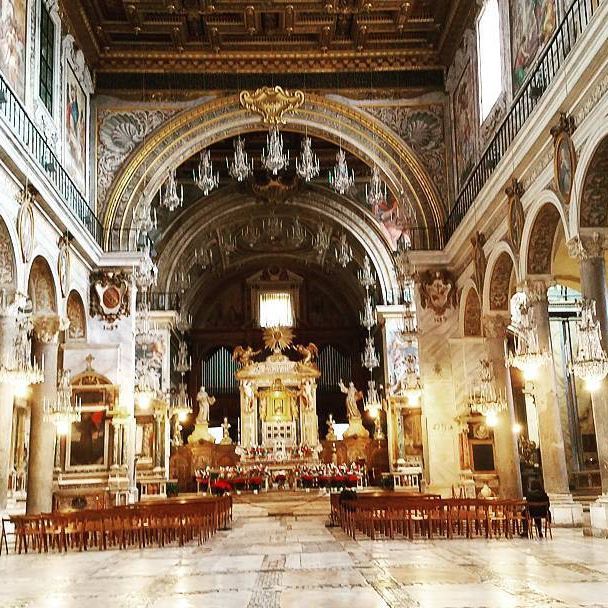 Finding small moments of reflection in some of Rome's most stunning basilicas. just me and my thoughts and the years of prayers filing the air around me. And #peace.
Finding small moments of reflection in some of Rome's most stunning basilicas. just me and my thoughts and the years of prayers filing the air around me. And #peace. 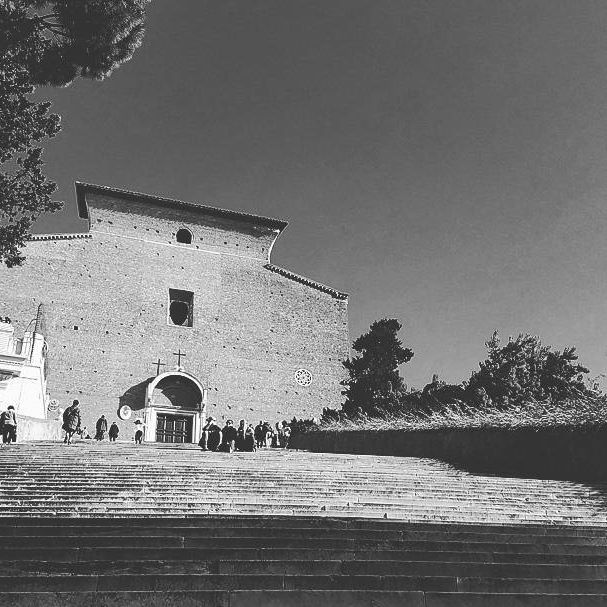 No biggie: jogged up 120 steps to the top of Capitoline Hill to visit the 13th-century basilica of Santa Maria d'Aracoeli. A simple exterior made of brown brick shelters an awe-inspiring interior of paintings, chandeliers and the tomb of Cecchino Bracci - pupil and lover of Michaelangelo.
No biggie: jogged up 120 steps to the top of Capitoline Hill to visit the 13th-century basilica of Santa Maria d'Aracoeli. A simple exterior made of brown brick shelters an awe-inspiring interior of paintings, chandeliers and the tomb of Cecchino Bracci - pupil and lover of Michaelangelo. 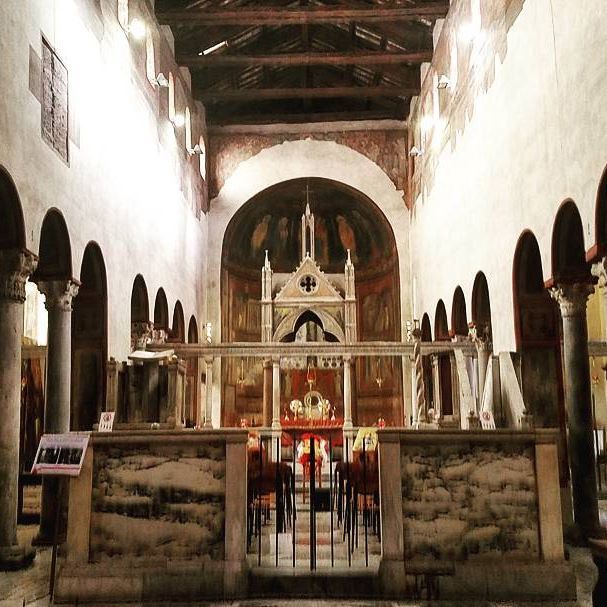 Entering the threshold of the Church of Santa Maria in Cosmedin, tears rose in my eyes. The calm and peace echoed off the cool, stone walls and the simplicity and sincerity of the church reminded me of my grandparents and the faith that they had.
Entering the threshold of the Church of Santa Maria in Cosmedin, tears rose in my eyes. The calm and peace echoed off the cool, stone walls and the simplicity and sincerity of the church reminded me of my grandparents and the faith that they had. 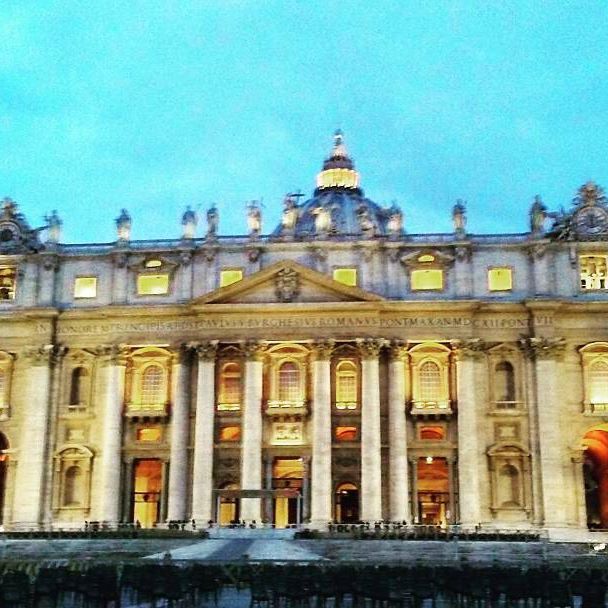 All that glitters is not gold may not be applicable in this situation. #Vatican ✨
All that glitters is not gold may not be applicable in this situation. #Vatican ✨
Being in an area where the WiFi is spotty at best and you have to pay extra for data has forced me to evaluate how dependent I am on a tiny, electronic device called the smartphone. Do I truly need it? Can the locals - people - help me navigate instead of a GPS machine?
It's tempting to use the data. The addiction to staying "connected" to the rest of the world is real, coming at the cost of failing to connect on a simple, human level with the people and culture of Italy.
So I make myself stow my phone away in my purse and take out a pen and paper. Maybe to write or observe is still a form of isolation. Is writing a lame attempt at engagement while still failing to talk, to make eye contact?
With eyes more often up then down, I make interesting observations about cultural norms in Lucca. I wonder what the element of trust is in this walled city. As open as I wish to think I or the U.S. is, there is not this type of honor system present in any transaction that I had previously witnessed. Are Italians in Lucca as a whole more honest, or am I just pessimistic,stingy and continuously doubting the ability of man to be trustworthy?
It is hard for me, I have realized, to understand a society or culture without first completely dismantling a very natural and very human, initial reaction: to use my cultural framework to evaluate,judge and perceive. And it is incredibly exhausting to have to take fifteen minutes rather then five to look at a place and try to understand it's patterns of behavior, use of space or cultural norms.
This journey accross the world is as much about discovering myself as it is about
discovering Italy.
No photo gallery from Italy would be complete with at least a dozen images of the many churches that line the streets of towns, much like the San Michele in Foro. The word forom is the derivative of foro, a nod to
the location of the church, which stands at the sight of what was once a
Roman forum, or public place, in the Tuscan city of Luca.
The Piazza Anfiteatro was once a amphitheater where gladiators fought and where your life lasted upwards to three minutes, but no biggie because now it's just a sunny Piazza surrounded with balcony-fronted
apartments.
The Lucca Cathedral's columns are each unique, with designs inspired by the city's silk production in the Middle Ages. While the Romans were organized and managed a massive civilization, the Tuscans have a long history of creativity, now reflected in the incredible details carved into the exterior of the cathedral.
A little over 48 hours in #Lucca, and I'm already sure I'll miss it's understated charm, quiet streets and the unlimited cups of coffee I get Hotel Rex.
I never thought I would soak up the quiet of a peaceful, slightly sleepy town like I am in Lucca right now. Cheers to tomorrow and exploring it's narrow streets, old wall and strangely Seattle-like weather.
Lucca in the light of a January, morning sun.
The light was coming from a four-story, yellow building that opened into a one-way street. Luccalibri Di Ciancarella Talitha is easily accessible to the drivers who park their vehicles in the parking areas bordering each side of the street and the pedestrians on the opposite side of the road, many of whom were taking the path running parallel to the city’s wall to navigate their way around the town.
The warmth that enveloped me as I entered the shop was followed by a moment of surprise. After studying abroad in Rome, Italy for about a month, I had grown used to the Italian method of drinking coffee: go to the bar, order your espresso, drink it standing up and leave promptly.
While a part of me appreciated the process of learning another way to enjoy the ritual of drinking coffee, another part of me missed the comfort of the American café, filled with tables and chairs that beckoned you to sit and relax, or bring a laptop and get some work done while enjoying your beverage.
But Luccalibri – which, interpreted, means “Luccabooks” – was unique in that while it offered the traditional, Italian coffee experience, it also provided a space for people to come together and engage for extended lengths of time.
The quiet swinging of the door opening preluded the entrance of
customers of various ages and in various modes of dress, many in groups or in pairs of two. Some sat in tucked-away corners under a window covered in black
grillwork. Women knitted in a cluster, talking in low voices.
An inaudible mummer filled the space that was half coffee shop and half bookstore.
The steady heat of music vibrated off wood: wood floors and bookshelves, wood transformed into paper and paper into pages and pages into stories.
Walking over the light wood floors, I approached a glass case containing a small
collection of pastries: butter cookies and biscotti, carefully arranged. The dark eyes and almost-there smile of the barista greeted me almost immediately.
I heard “Ciao” spoken more often than “Buonosera”, which is a more casual way of saying “Hello” in Italian, like the English word “Hi”. Perhaps the word choice indicated a greater level of familiarity and a potential relationship between the barista and the customer. The word was spoken differently than it is in Rome, with a wider “a” and a drawn-out “o”.
The barista moved fast and softly, seeming to know your questions before you asked them – he responded to my unspoken query by telling me, “You can pay afterward” – and weaved deftly behind the bar, among the tables and couches and the customers reading, scrolling on their cellphones or talking in clusters and pairs of two.
“Arrividerci”, the customers said often after they greet the barista, ordering their espresso or buying a book from the bookstore. The greeting means “See you later” in Italian, a term most often used when saying goodbye to someone you will see again soon.
I brought my cappuccino in its small, white Illy mug to the bookstore side of the shop and sipped it among the volumes on politics, cooking and children’s stories.
While the book section on the left side of the shop was well stocked, the space remained empty of people. Instead, patrons congregated among the books and wicker chairs on the right side of building. Shifting slowly, with hands held close together, they engaged in conversation.
It was now five o’clock in the evening and people were saying, “Buonosera” in greeting. The sound of voices and the murmur of movement grew and
was accentuated by the sizzle of food on an open griddle.
As steam rose from the grill, the darkness outside the windows deepened. A few people left, but most stayed, seated. They huddled over tables and leaning forward into half-circles on couches.
I was sitting directly beneath a stereo, through which the volume of music increased towards 5:20 p.m. I was still novice enough in Italy to know whether the
strains were Italian or not. And with the crescendo a similar quickening in energy spread throughout the shop, and the demographics of the customers began to change.
Mingling with the music was the jingle of coins on the glass counter, which reverberated through the shop along with the sound of a man blowing his nose into a cloth handkerchief.
Two men took their drinks and stand at a wood table pushed against the wall, one that divides the café portion of the shop from the bookstore. They mimicked each other in the simple process of coffee drinking in Italy: accept cup. drop sugar, stir, sip, nod at the barista and leave.
And up, within and out of the crescendo there was a general air of chill, relaxation. This was a meeting place of social interaction and commerce, a space to connect, to enjoy the flavor of an espresso or the sweet taste of a pastry, to bide your time before a late, Italian dinner or be reminded of the significance of the coffee experience globally.
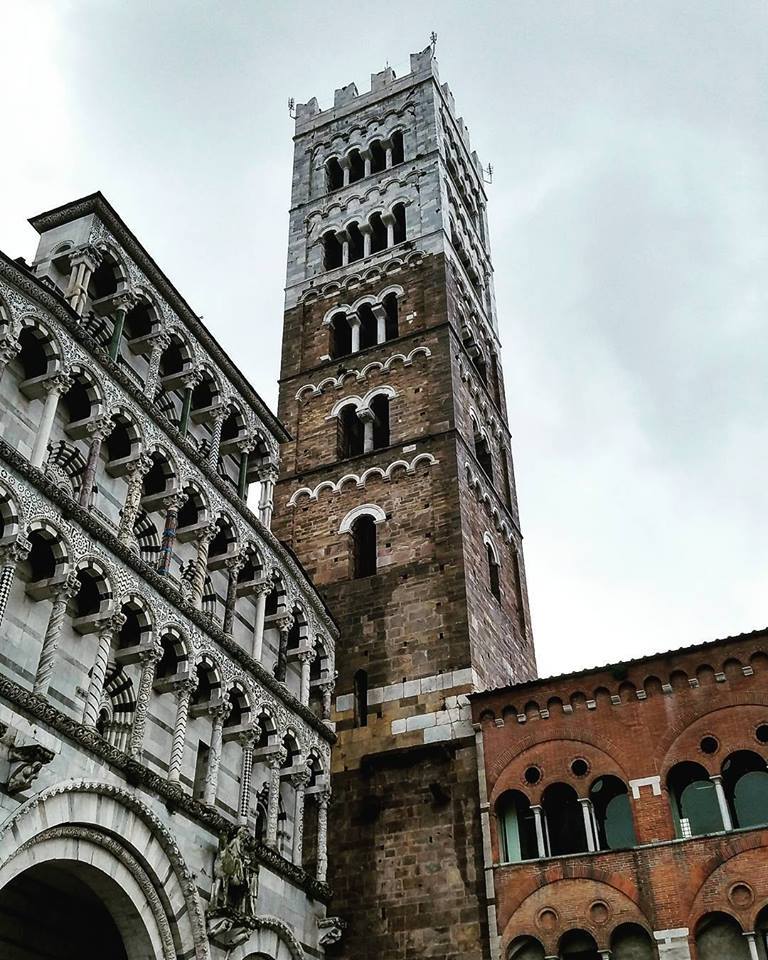 The Lucca Cathedral's columns are each unique, with designs inspired by the city's silk production in the Middle Ages. While the Romans were organized and managed a massive civilization, the Tuscans have a long history of creativity, now reflected in the incredible details carved into the exterior of the cathedral.
The Lucca Cathedral's columns are each unique, with designs inspired by the city's silk production in the Middle Ages. While the Romans were organized and managed a massive civilization, the Tuscans have a long history of creativity, now reflected in the incredible details carved into the exterior of the cathedral. 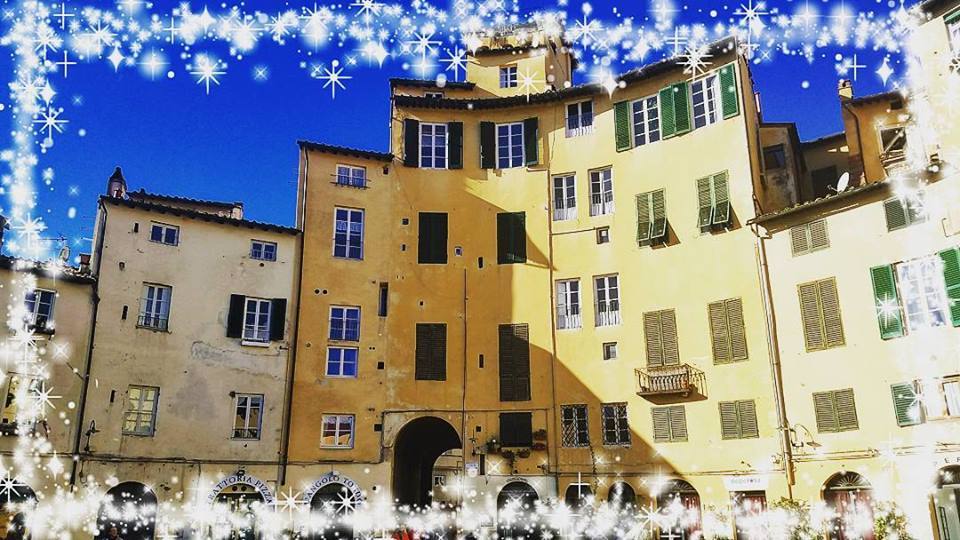 The Piazza Anfiteatro was once a amphitheater where gladiators fought and where your life lasted upwards to three minutes, but no biggie because now it's just a sunny Piazza surrounded with balcony-fronted apartments.
The Piazza Anfiteatro was once a amphitheater where gladiators fought and where your life lasted upwards to three minutes, but no biggie because now it's just a sunny Piazza surrounded with balcony-fronted apartments.
A lost debit card. An inability to access funds.. A phone that closes its eyes and gives me a blank stare from an invisible screen. I'm twirling. Help.
But one thing that I have learned is that I am strong, resilient and resourceful. I make my euros stretch, eat sparingly because I have to, and negotiate a change of card as well as the wiring of funds. None of this would be possible without the help of my mother, thousands of miles away and nine hours in time behind me.
Some days I just sit in my tiny apartment, take deep, deliberate breaths and try to debate on how this is all going to work out. What's the next step?
But, ironically, one of the quintessential aspects of travel has bit me and injected this situation with serendipity. Randomness. Unanticipated obstacles. I don't want any of them, but I can't evade their permanence.
Because life is serendipitous and I am only a human wanting desperately to figure it all out.
My life philosophy: don't say no to chances, to
trying new foods and visiting new places; to connecting with people and walking through
open doors. open your heart and you open your world.
"Life is so subtle sometimes that you barely notice yourself walking through the doors you once prayed would open."
- Mounaks
"Yes, I am a dreamer. For a dreamer is one who can find his way by moonlight, and see the dawn before the rest of the world."
- Oscar Wild
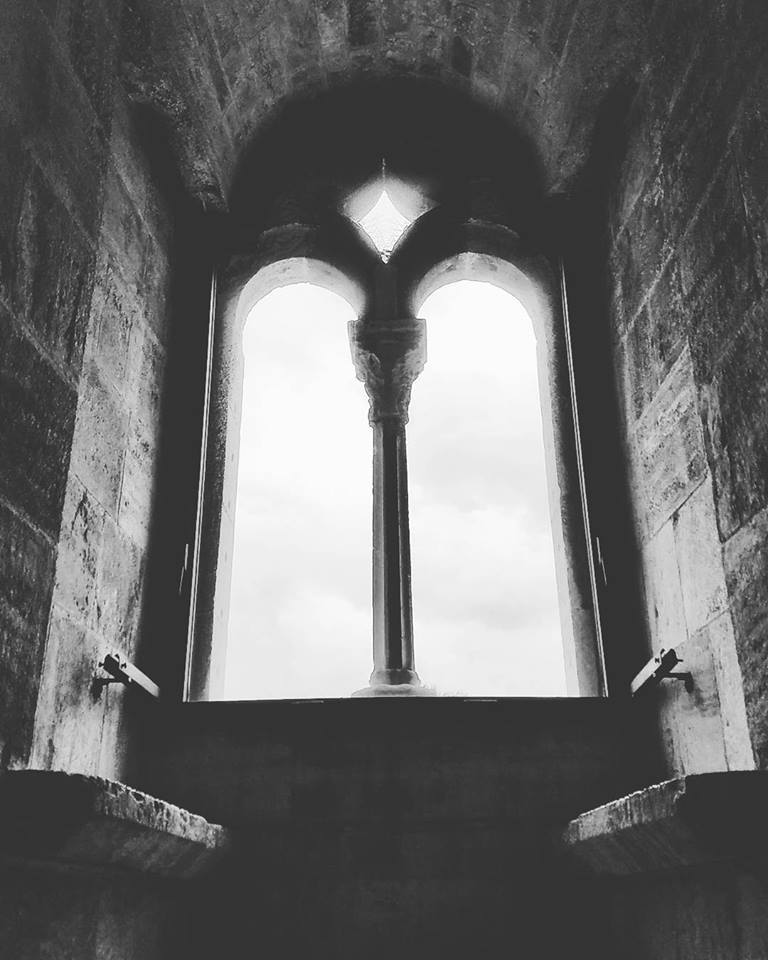 I have this thing for windows and doorways. Half of it is due to their esthetic appeal: the perfect arches and molding, the deep waves pressed into the old glass and the way they are built snugly into thick, stone walls. And the other half of me sees the symbolism that doors and windows possess, in that they usher in new possibilities and close the door on the past. They let in light
I have this thing for windows and doorways. Half of it is due to their esthetic appeal: the perfect arches and molding, the deep waves pressed into the old glass and the way they are built snugly into thick, stone walls. And the other half of me sees the symbolism that doors and windows possess, in that they usher in new possibilities and close the door on the past. They let in light
that we as humans so desperately need and allow us to view the world streaming down below.
This window is located in the Castello Normanno-Svevo, located in the southeastern city of Bari, Italy.
But over the last couple weeks, I've been spending some time thinking about how my photographs of Rome influence how others are seeing this city.
Images are powerful, and a quick Google search of "Rome" will bring up all the stereotypical photos that tourists and excited study-abroad students like myself eat up. But these images are not going to help someone understand a little of the personality and nuanced dynamics of Rome and Roman culture.
What are aspects of Roman life and everyday culture? A couple thoughts pop in my head: waiting for buses that are more often late then punctual; hawkers selling everything from rings to selfie sticks to phone adapters. Fire dancers at night at Piazza Navona. Jaywalking and standing at bars, sipping cappuccinos in the morning and strong espresso in the late afternoon. Teenagers gathered closely around the edges of monuments centered in piazzas around the city.
As a photographer, do I see the stereotypes? Why am I seeing them? I wonder if I look for them deliberately or if it is an unconscious move to document the obvious. And what scares me the most is that the images I am sharing are reinforcing stereotypes.
This brings up the importance of audience even before I even snap the shutter on my phone. An essential element that will make my images so much richer is that they include some snippet of information. Not info for info's sake, but something that helps to contextualize the image, tell a story and convey an aspect of culture that isn't obvious.
How are my images influencing how people view Rome and - more broadly - Italy? In my own attempts to understand the culture in this community, are my ideas of reality an extension of my own culture?
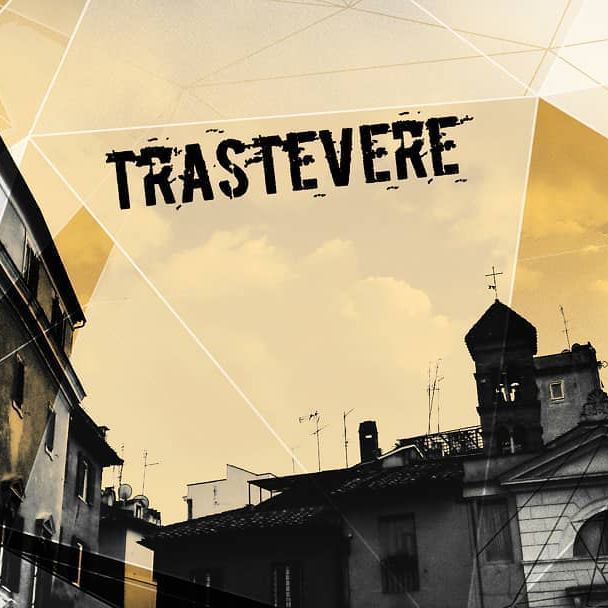 Trastevere means "beyond the river". It's ironic that this neighborhood in Rome was given that name, considering that it is literally on the other side of the river from the very heart of Rome. But this slight distance turned out to be an asset for the community, since it is able to maintain its own personality, full of art galleries, cozy eateries, a stunning church and
Trastevere means "beyond the river". It's ironic that this neighborhood in Rome was given that name, considering that it is literally on the other side of the river from the very heart of Rome. But this slight distance turned out to be an asset for the community, since it is able to maintain its own personality, full of art galleries, cozy eateries, a stunning church and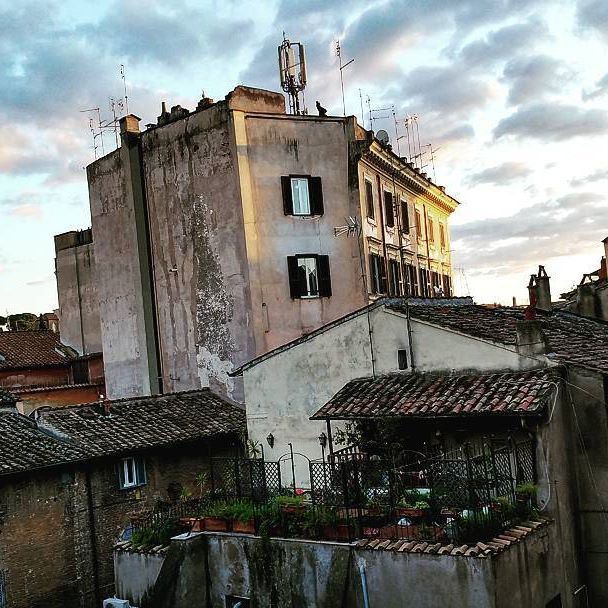 Every morning, waking up to the chatter of boys in the bathroom of the school next door, I would open the shutters of my bedroom window and gaze at my neighbor's apartments. Sometimes I would see people moving around in them, little blots in the distance half-shaded by their own shutters and glass that was far from crystal-clear.
Every morning, waking up to the chatter of boys in the bathroom of the school next door, I would open the shutters of my bedroom window and gaze at my neighbor's apartments. Sometimes I would see people moving around in them, little blots in the distance half-shaded by their own shutters and glass that was far from crystal-clear.
And sometimes the sun would hit the rugged, weathered surface of the building and warm the sandy stone into a shade of gold that I will forever associate with Rome. Maybe this image doesn't strike you as pretty, but to me, it became a familiar joy to watch my neighborhood wake up. At the window, you could hear the sounds of life beginning for the day: vendors
setting up tables at the restaurant on the block, people walkin at a clip down the cobblestone streets towards the center of the city, the distant sound of road workers and the bubble of coffee in my moka pot.
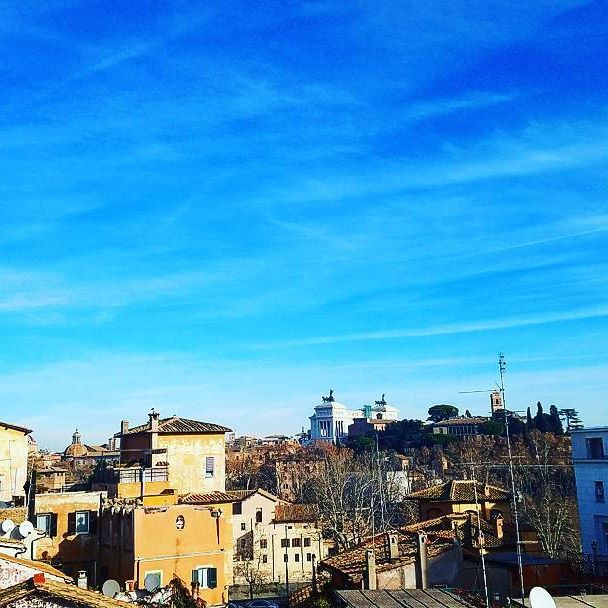 Day 2: My apartment in Rome was located on the fourth (in Europe, third) floor of a small apartment building on Via Titta Scarpetta. Looking out the three windows of our apartment, I could see that all of my neighbors had access to their rooftops. Many of these rooftops had plants arranged around seats, creating a type of fifth-floor garden from which to overlook the city.
Day 2: My apartment in Rome was located on the fourth (in Europe, third) floor of a small apartment building on Via Titta Scarpetta. Looking out the three windows of our apartment, I could see that all of my neighbors had access to their rooftops. Many of these rooftops had plants arranged around seats, creating a type of fifth-floor garden from which to overlook the city.I was excited, sure that our own apartment building had a rooftop, and I didn't care if it had plants or seats; I just wanted a space to watch the sun rise and the sun set over Rome.
Isolation - The word is seeped into the town’s history, a community that has weathered the movement of civilizations due to its physical elevation. And stepping out of the tram at the station that leans against the edge of the ledge, I could immediately visualize the haven that topography has created for the people who call the outcropping of volcanic tuff “home”.
The isolation at this point is merely geographical; I have no idea if living in this region, high above the rolling hills of Umbria and far from a large city, creates a social separation.
But it can be worked to an advantage, and today Orvieto goes about it business while strangers wander through it, marveling at its very existence.
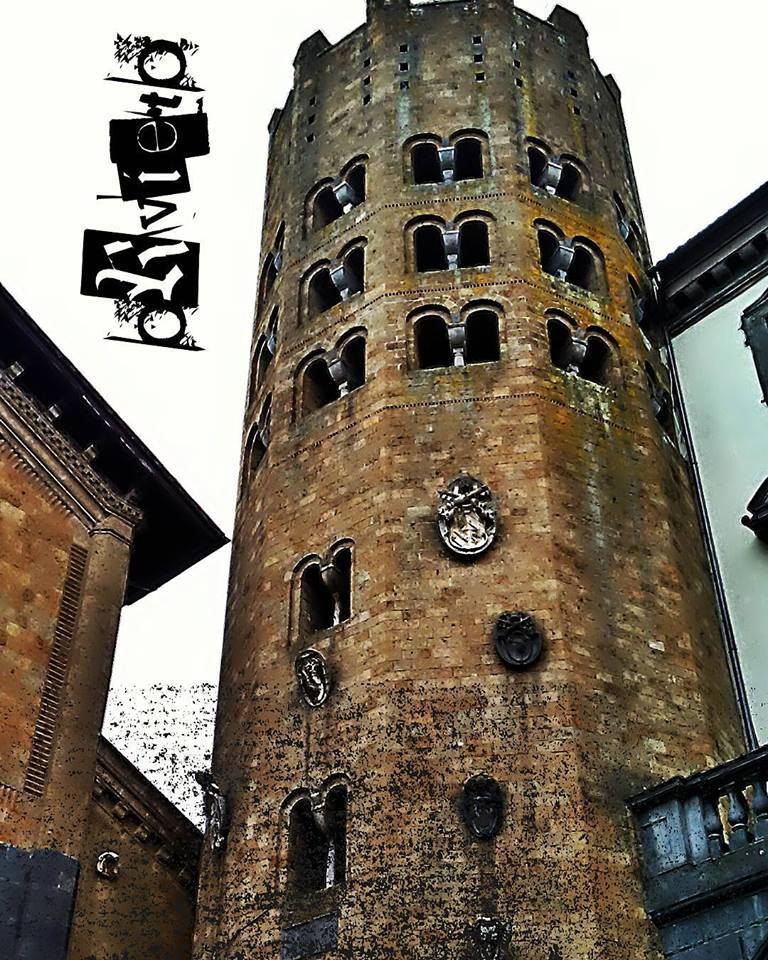 The bells chime at 11:00 a.m. as a silver vehicle pulls up to the front of Chiesa di Sant’Andrea. A hush settles as a priest and four other men - three in clerical garb - exit a room at the back of the church. Doors extending from the back of the vehicle are opened as a casket is raised onto the shoulders of four men. Another man stands at the foot of the steps, holding a wreath of flowers in his hand. No visible crying or exterior show of emotion
The bells chime at 11:00 a.m. as a silver vehicle pulls up to the front of Chiesa di Sant’Andrea. A hush settles as a priest and four other men - three in clerical garb - exit a room at the back of the church. Doors extending from the back of the vehicle are opened as a casket is raised onto the shoulders of four men. Another man stands at the foot of the steps, holding a wreath of flowers in his hand. No visible crying or exterior show of emotion
is present on the faces of those gathered. The tragedy sometimes associated with death is not apparently emphasized. I see no tears, hear no sobs. Only the clenching of hands and kisses on each cheek. The bells chime several times more.
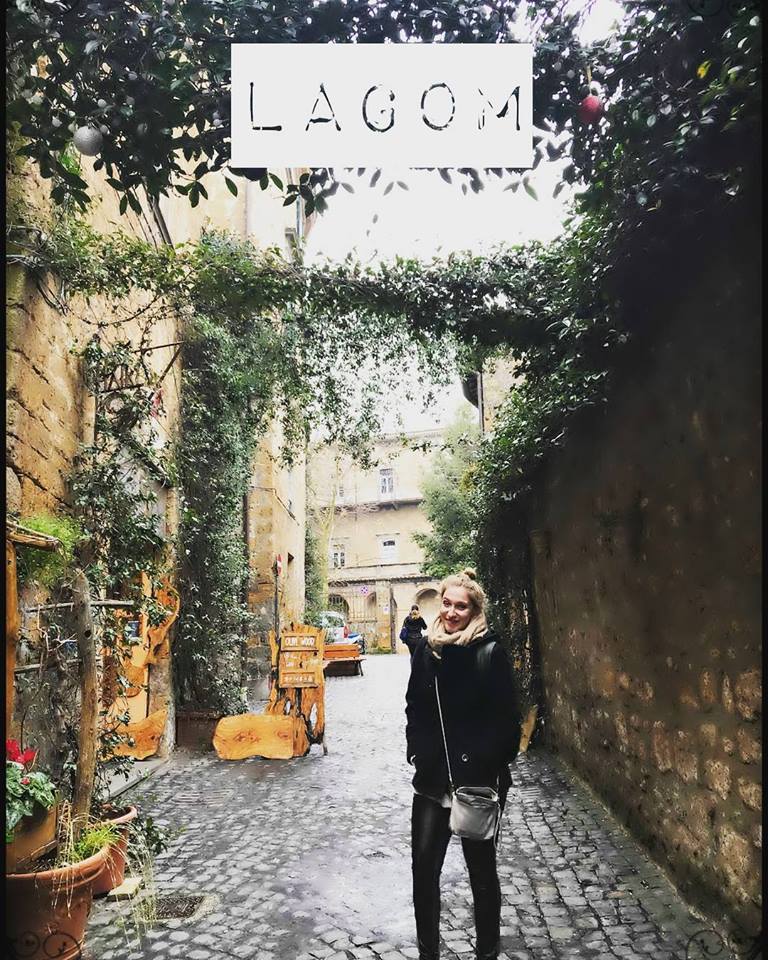 I learned about the word "lagom" when I was on a desperate word search to find a word that best described the feeling I had wandering the stone-cold (literally) streets of Orvieto, peeking into churches hushed and empty and sipping a cappuccino at a warm cafe. Lagom is Swedish, and means not too much and not too little - just right. It's more than an emotion, it's a state of being, a way of living where you acknowledge that you have
I learned about the word "lagom" when I was on a desperate word search to find a word that best described the feeling I had wandering the stone-cold (literally) streets of Orvieto, peeking into churches hushed and empty and sipping a cappuccino at a warm cafe. Lagom is Swedish, and means not too much and not too little - just right. It's more than an emotion, it's a state of being, a way of living where you acknowledge that you have
what you need and do not need more then that. It means finding cute alleys where trellises clamber of the cobblestone ground and where you don't mind the rain because it nourishes the earth. It is just right.
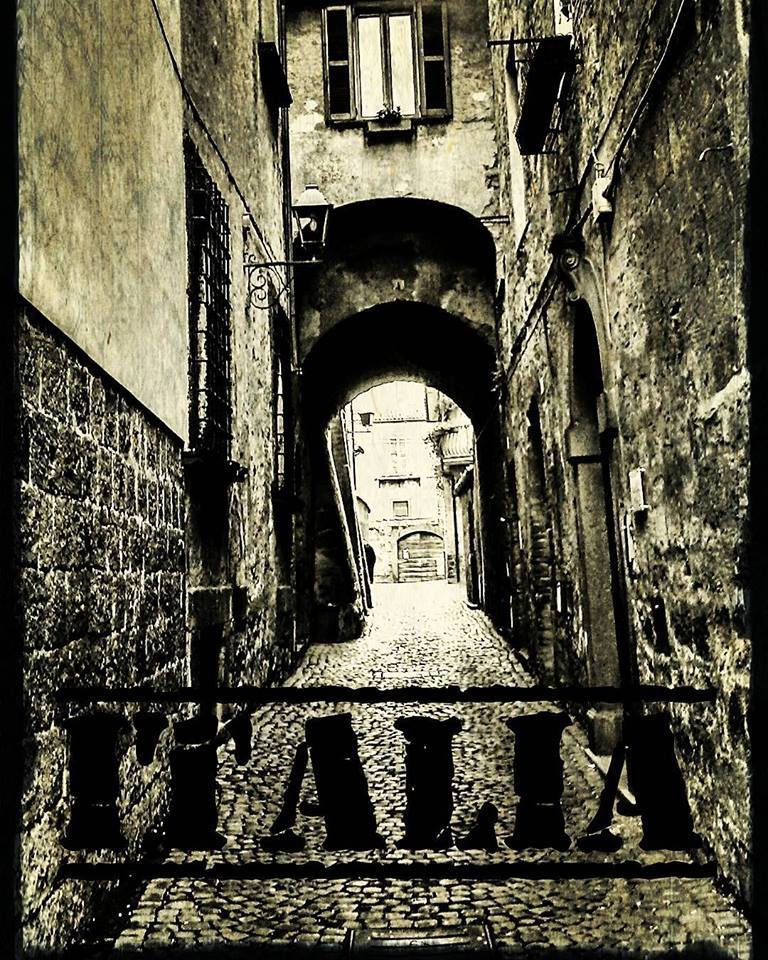 The atmosphere is like held breath, a relative silence broken by an
The atmosphere is like held breath, a relative silence broken by an
occasional rumble of a car speeding uphill along the middle of the town’s main street. A door closes with a brief thump, two women stand in the middle of the street and chat. There is a stillness as we descend higher, up and deeper into the town. Buildings - homes, apartments, shops - approach the walker from each side of the street. There are few shutters open and no vendors selling jewelry, knick knacks or electronic accessories on the edge of stone streets. 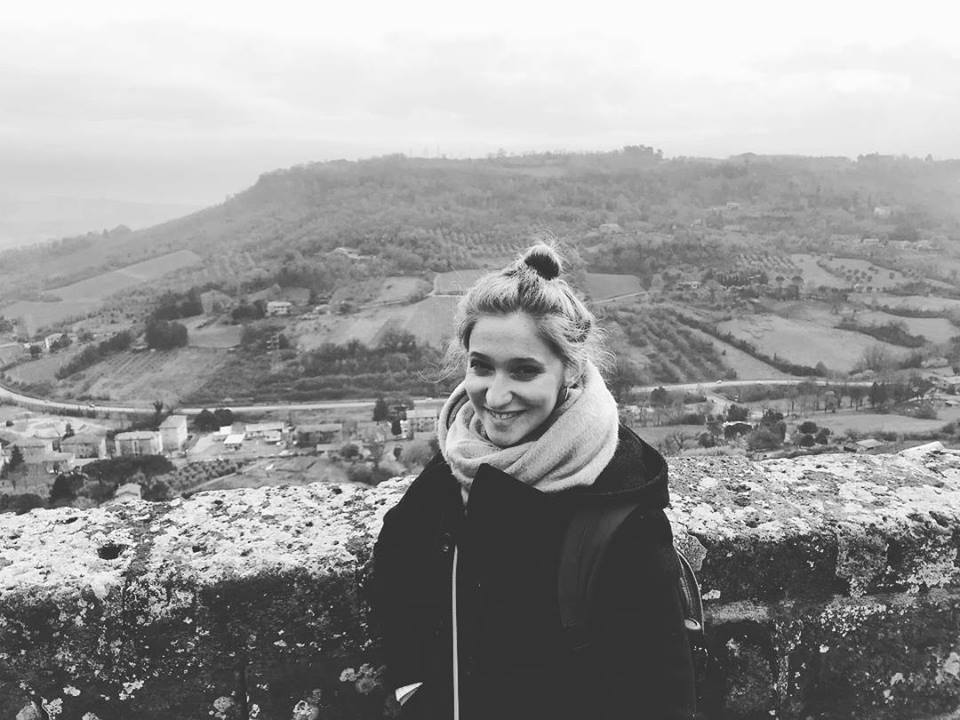 Something about a small town relaxes me, makes me release my grip on my handbag, walk more slowly and breath in the sharp, clear air scented by a recent rain.
Something about a small town relaxes me, makes me release my grip on my handbag, walk more slowly and breath in the sharp, clear air scented by a recent rain.
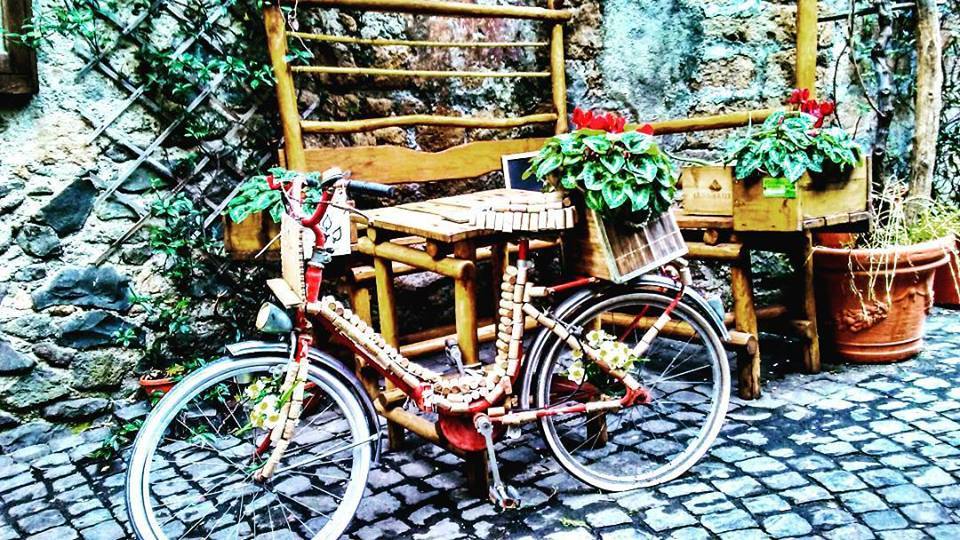 At first, there is a seeming presence of disparates: cold and warmth, gray and amber, light and shadows. A casual evaluation of the character of the community in and around Orvieto leaves the visitor grasping to connect it’s chill, mid-winter front with the threads of warmth (both visual and artistic) that coexist along with lower temperatures and an isolated geography. But despite the distance created by its presence on the upper reaches of volcanic tuff, the city contains the smallest of cultural artifacts, traditions and crafts that bring an added richness to its identity.
At first, there is a seeming presence of disparates: cold and warmth, gray and amber, light and shadows. A casual evaluation of the character of the community in and around Orvieto leaves the visitor grasping to connect it’s chill, mid-winter front with the threads of warmth (both visual and artistic) that coexist along with lower temperatures and an isolated geography. But despite the distance created by its presence on the upper reaches of volcanic tuff, the city contains the smallest of cultural artifacts, traditions and crafts that bring an added richness to its identity.
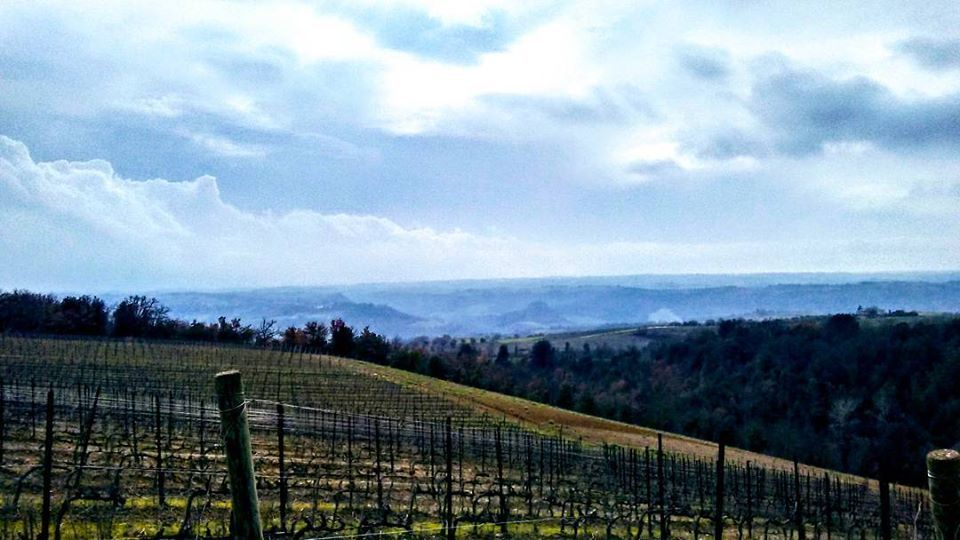 I had felt at home in the quiet seclusion of Orvieto, but stepping onto the soil of the hills surrounding the town left me breathless. While I love the adventure and excitement of the city, my heart and soul is stilled by the peace I find in nature, and walking around the Decugnano dei Barbi winery made me feel oddly at home, thousands of miles away from my actual one. Rolling hills met and narrow ravines and my eyes were captured by the even geometry of the rows of grape vines.
I had felt at home in the quiet seclusion of Orvieto, but stepping onto the soil of the hills surrounding the town left me breathless. While I love the adventure and excitement of the city, my heart and soul is stilled by the peace I find in nature, and walking around the Decugnano dei Barbi winery made me feel oddly at home, thousands of miles away from my actual one. Rolling hills met and narrow ravines and my eyes were captured by the even geometry of the rows of grape vines.
Stripes like bars line the shirts of the gondola drivers, who stand with incredible balance at the rear of the boats. They guide the narrow, slight vessels through alternately reflective and murky waters. An occasional foot is lifted against a stone ledge extending into the canal from a building, and they push against the structure’s lower walls, causing the gondola to slide away from the rough, stone edges and into the middle causeway of the canel.
The water is like a person: complex being whose mood changes and whose face makes little attempt to hide its emotions. Each canal that curls around Venezia's many islands has its own expression: illuminative and reflective, murkey and smokey, a mirror for the sky above and the life around. They are shallow beds of liquid which allow you to glimpse a shadow of their floors.
Sounds are at once everywhere and nowhere. Early morning stillness pervades the spaces, where even the gondola drivers are not shouting and talking to one another. There is a scuffle of feet on the smooth, stone walkways littered with a rainbow of confetti left over from the previous night's Carnival revelry.
Vegetable vendors are calling out prices from their boats moored to streets. And as the morning wakens, the throngs of people crossing narrow bridges and alleyways grows thicker: a mass of faces and masks and occasional luggages rumbling over stone ridges.
See the sun rising over the tips of a bridge ahead.
Buongiorno, Venezia.
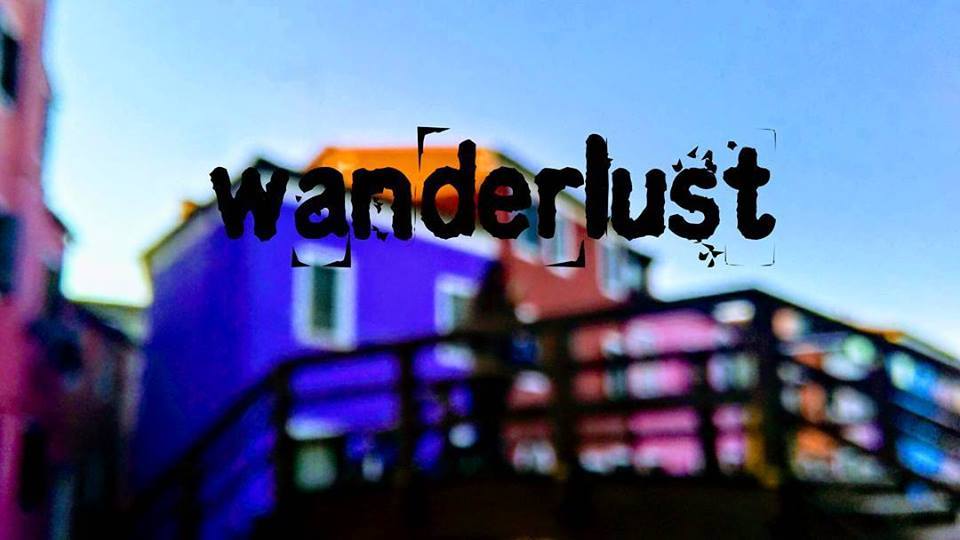 The word "wanderlust" is special to me, in part because of what the words means. Wanderlust is a strong desire or impulse to explore, and it is this thirst for adventure and passion about discovering your world that makes this word special to me. You don't even have to wander far; maybe it means exploring a new neighborhood in your city, going on a hike that you've never been on before, or ordering a new coffee at your favorite coffee shop. It's a mindset, a lifestyle a way of thinking that values the unexpected and the smallest of wonders that remind you that every day is a chance to discover, learn and grow.
The word "wanderlust" is special to me, in part because of what the words means. Wanderlust is a strong desire or impulse to explore, and it is this thirst for adventure and passion about discovering your world that makes this word special to me. You don't even have to wander far; maybe it means exploring a new neighborhood in your city, going on a hike that you've never been on before, or ordering a new coffee at your favorite coffee shop. It's a mindset, a lifestyle a way of thinking that values the unexpected and the smallest of wonders that remind you that every day is a chance to discover, learn and grow. 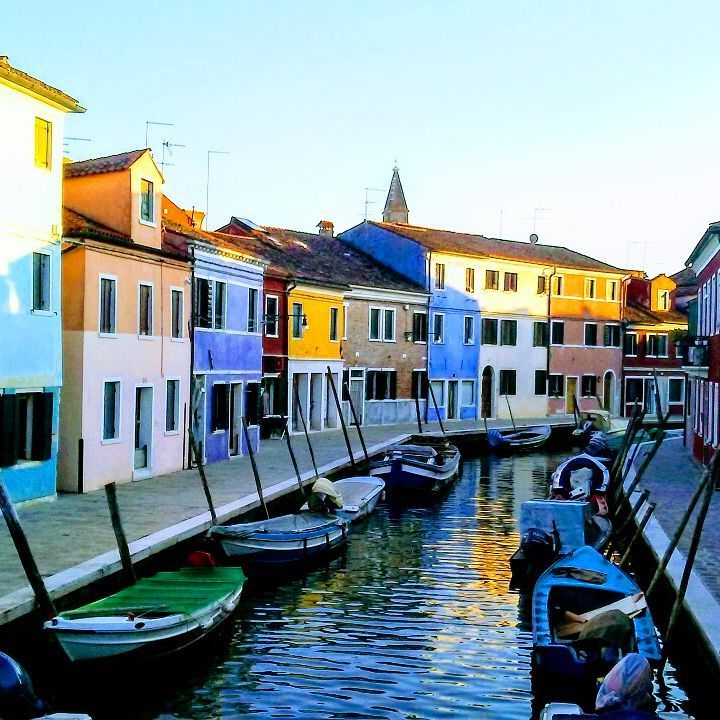 No visit to the magical city of Venezia would be complete with taking a day trip out to the Burano. The Venetian island is a little less then 10 kilometers away from Venezia, and is famous for its brightly colored homes. Painted in various pastel and neon shades, According to legend, the homes were painted brightly in order to guide fishermen returning home in the dark and fog. The city is also famous for its lacework industry.
No visit to the magical city of Venezia would be complete with taking a day trip out to the Burano. The Venetian island is a little less then 10 kilometers away from Venezia, and is famous for its brightly colored homes. Painted in various pastel and neon shades, According to legend, the homes were painted brightly in order to guide fishermen returning home in the dark and fog. The city is also famous for its lacework industry. 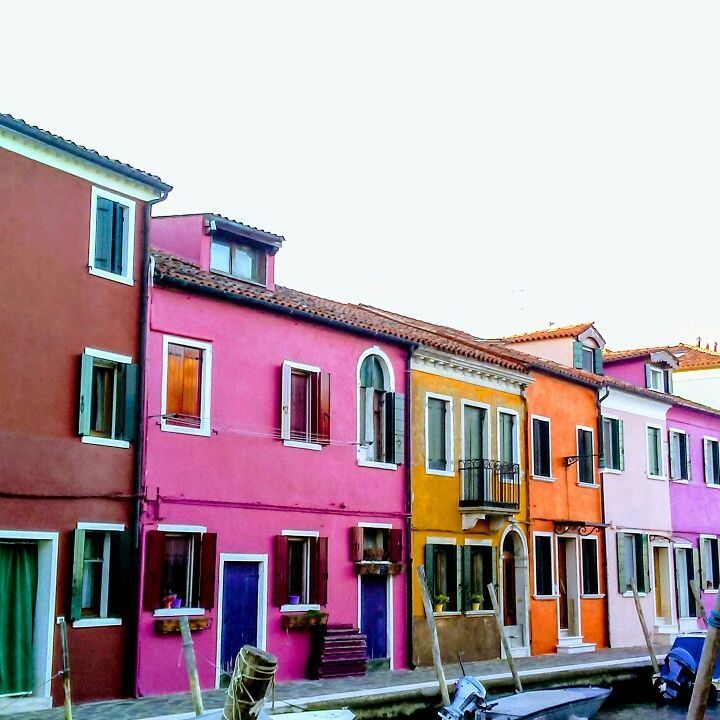 Myself and two of my friends visited Burano on the second day of our visit to Venezia. For 20 euros, we booked a boat that took us to the three Venetian islands of Torcello, Murano and Burano. The island of Murano is famous for its blown-glass industry and Torcello is an ancient island inhabited since 452 AD, although there are few residents living there today.
Myself and two of my friends visited Burano on the second day of our visit to Venezia. For 20 euros, we booked a boat that took us to the three Venetian islands of Torcello, Murano and Burano. The island of Murano is famous for its blown-glass industry and Torcello is an ancient island inhabited since 452 AD, although there are few residents living there today. 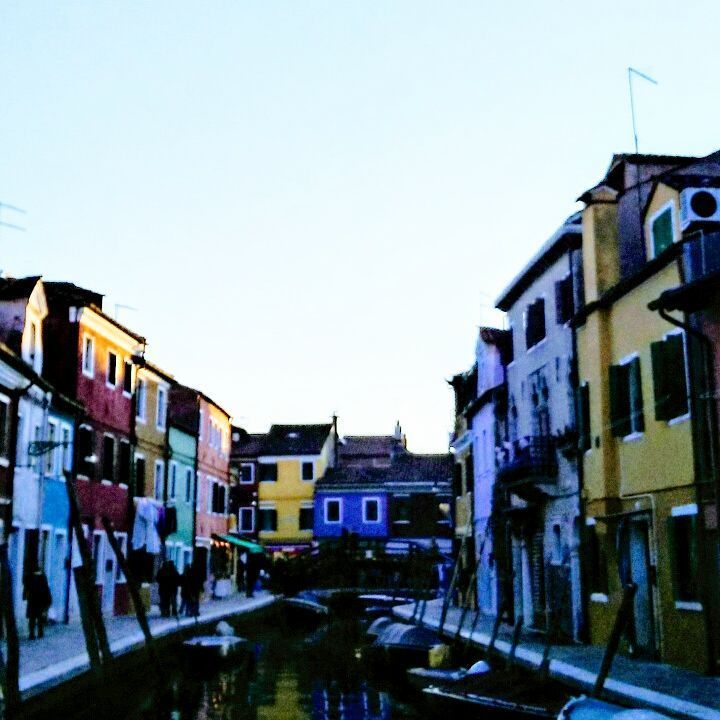
 The introvert in me wanted to find a quiet, secluded part of the island that was not overwhelmed by tourists and Carnival celebrators. And I quickly discovered that wandering down various side streets, and following different canal routes, would lead me to the most magical locations. I was walking on water, sheltered from the wind by tall homes painted in lavender, aqua blue and rose, many with window boxes and second-floor balconies.
The introvert in me wanted to find a quiet, secluded part of the island that was not overwhelmed by tourists and Carnival celebrators. And I quickly discovered that wandering down various side streets, and following different canal routes, would lead me to the most magical locations. I was walking on water, sheltered from the wind by tall homes painted in lavender, aqua blue and rose, many with window boxes and second-floor balconies. 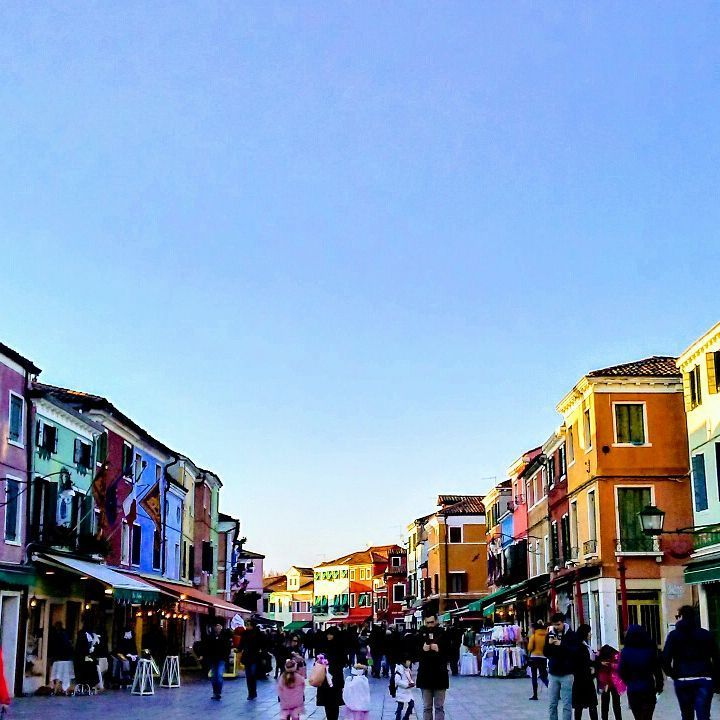 The clear skies and warm, winter sun made the water surrounding and weaving through the city sparkle, and the festive vibe was accentuated by the Carnival celebrations occuring. While the festival was much smaller in scale compared to Venezia, the little town had come alive. Music blasted from a stage located in a large piazza, shop doors were open with visitors streaming in and out of lacework shops and pasteccerias. Confetti was stream over the streets by children and a marching band of teenage girls in red uniforms made its way through the streets.
The clear skies and warm, winter sun made the water surrounding and weaving through the city sparkle, and the festive vibe was accentuated by the Carnival celebrations occuring. While the festival was much smaller in scale compared to Venezia, the little town had come alive. Music blasted from a stage located in a large piazza, shop doors were open with visitors streaming in and out of lacework shops and pasteccerias. Confetti was stream over the streets by children and a marching band of teenage girls in red uniforms made its way through the streets.
You can’t completely leave a place when the place has not left you.
Not a metamorphism, not quite a transformation. The impact is subtle, translucent. It dwells in the fuzzy world of feelings, emotions, perspectives, inner urges and moods.
Once you enter the place, the place enters you.
At last, my eyes shut for eight hours each night and I wake with a spring in my step, my brain quieted and my body at rest.
But these are physical, physiological changes that can be seen and felt more sharply and explained more clearly.
The ones that dwell in the subconscious are easily as influential, but we discredit them because they do not have the guts to come out in the open.
We’re too afraid to open the door to our inner fears and longings and let them out in the open of who we are.
Without even realizing it, I allowed myself to open those doors, and – over the last few months – I’ve become better acquainted with both myself and the world.
Maybe it’s been Rome, but I’m pretty sure that it’s a combination of
each city that I visited: Lucca, Bari, Paris, Barcelona, Bologna, Orvieto, Napoli,
Pompeii. There are little bits of me scattered among their streets and churches, their coffee shops and piazzas.
One door at a time.
I have learned to laugh more freely, because laughing is one of the most enjoyable activities we as humans can do. It’s like a little dose of medicine on the edges of our crusty hearts.
Remembering to eat and nourish my body with a variety of foods and spices that intrigue and teach me about culture and art more deeply.
Opening my heart up to new friendships and confidences.
Trying to pinpoint what in me has changed, I find that it isn’t as much a change as a growing, a stretching. Reaching for the big, blue sky with open palms facing upward.
My eyes are both open.
But so is my heart.
Maybe that’s what’s grown: the crux of being human.
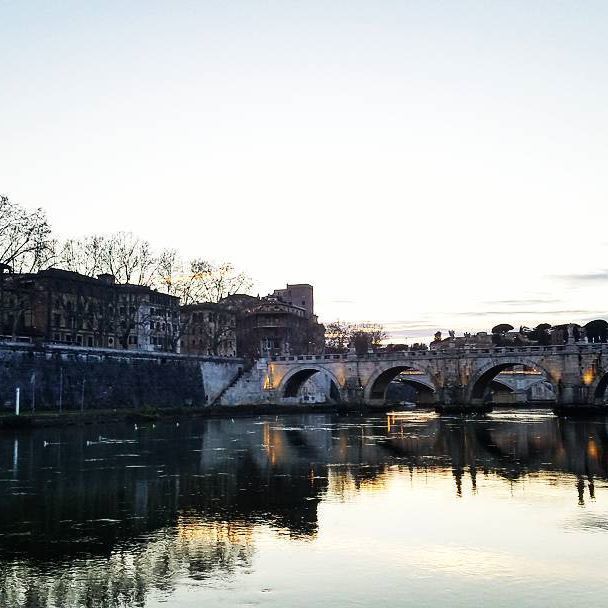 Was it all in a fantasy | Where are you now | Were you only imaginary
Was it all in a fantasy | Where are you now | Were you only imaginary 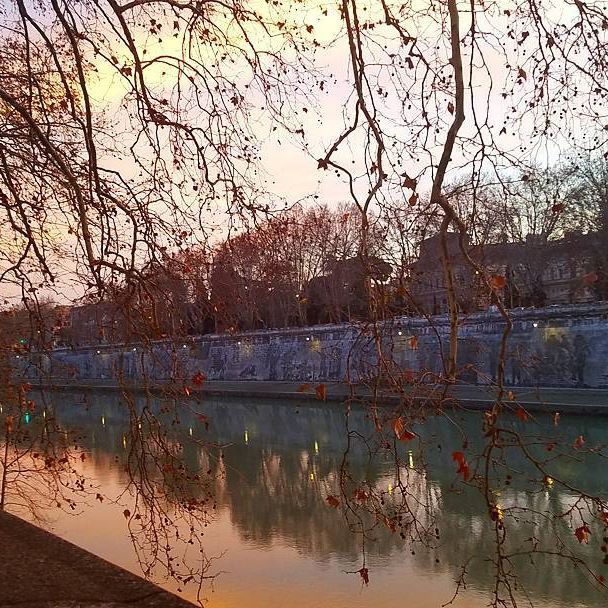 "It's almost impossible to watch a sunset, and not dream." - Bern Williams
"It's almost impossible to watch a sunset, and not dream." - Bern Williams 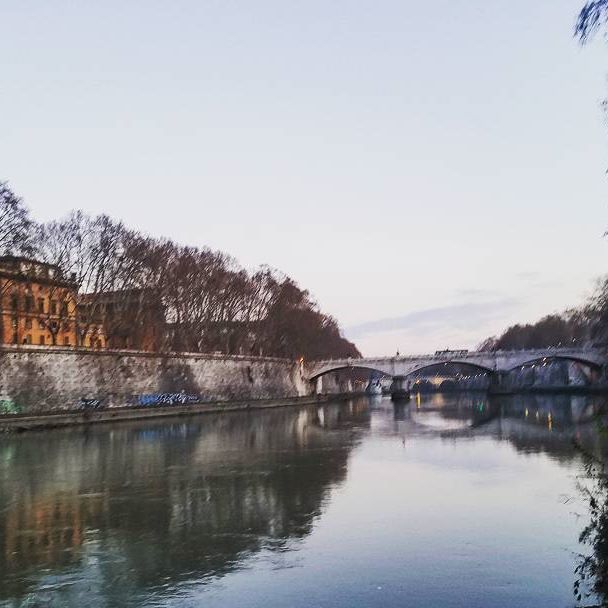 You are walking in the nature that #Monet loved. Paint the picture of that memory. #nature #sunset #riverside#eveningescapades
You are walking in the nature that #Monet loved. Paint the picture of that memory. #nature #sunset #riverside#eveningescapades 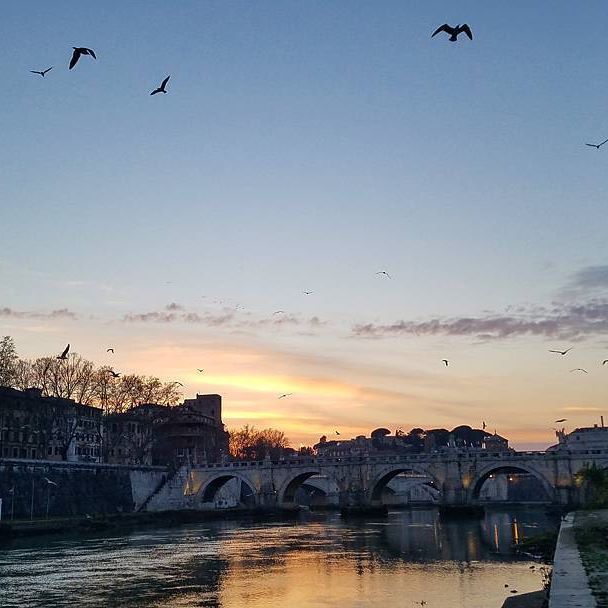 breathing dreams
breathing dreams 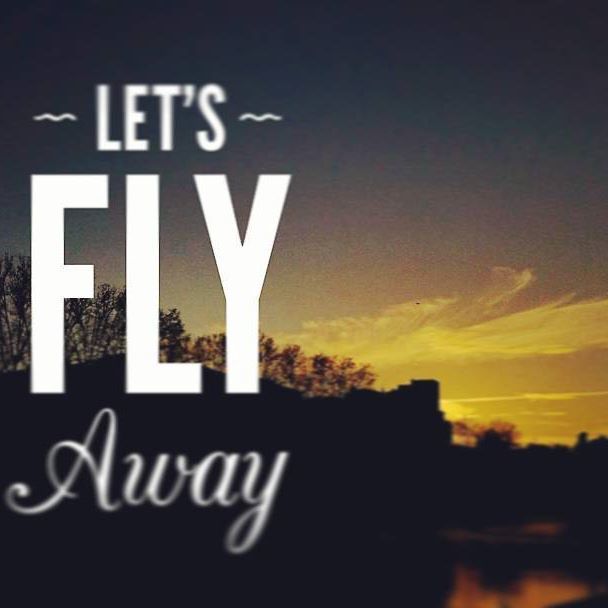 One day I'll fly away...
One day I'll fly away...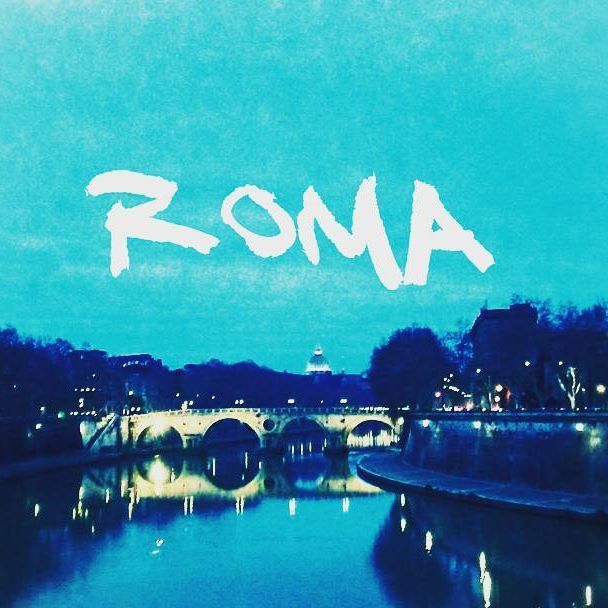 Finding those turquoise vibes, those sunset walks on the river stealing my heart away.
Finding those turquoise vibes, those sunset walks on the river stealing my heart away.
hopefully this isn't too awkward ;)
I am a journalism student, amateur photographer, feminist, and forever curious world wanderer.
I'm a reporter for The Daily of the University of Washington, and a Social Media & Marketing Intern for Fierce, Inc.
My passion for storytelling is communicated through the written word and the power of imagery to connect people globally.
As a PNW resident, I am interested in elevating diverse stories from the Seattle area and sharing the beauty to be experienced in the #evergreenstate.
I drink coffee for a hobby, read voraciously and strongly believe that the world is our neighborhood.
I love to get feedback about what I write, share and photograph, or just talk about random ideas. Feel free to reach out if you have any questions about my experiences in Europe or abroad, or have any recs for great coffee places!
Email: hannahpickering1995@gmail.com
Website: https://hannahpickering199.wix...
Facebook: @Hannah Pickering
Instagram: hannah.e.pickering
Twitter: @Hannah_Pick95
Tumblr: @hpicke1